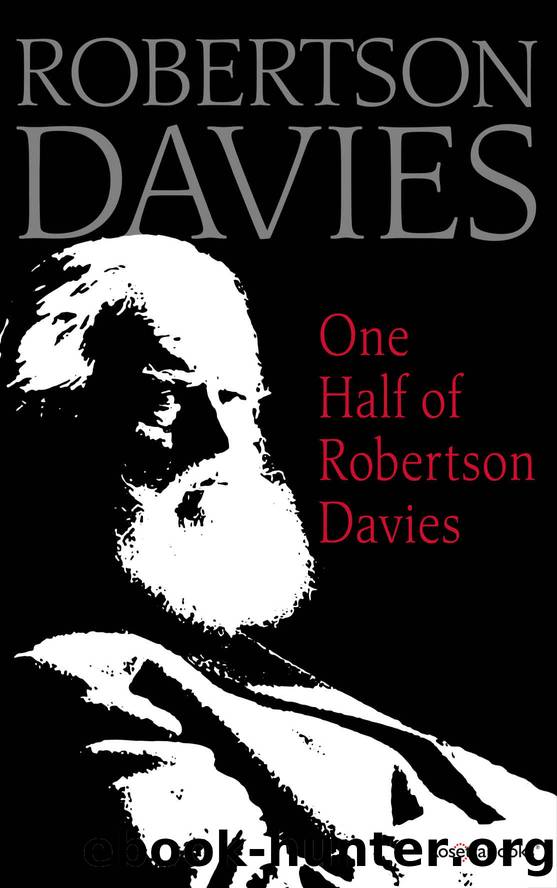One Half of Robertson Davies by Robertson Davies

Author:Robertson Davies
Language: eng
Format: epub
Publisher: RosettaBooks
Published: 2019-02-20T14:48:26+00:00
Hardress, who is that with you?
HARDRESS: Only Danny Mann, my boatman.
KYRLE: That fellow is like your shadow.
DANNY: Is it a cripple like me, that would be the shadow of an elegant gentleman like Mr. Hardress Cregan?
The author of The Colleen Bawn was no Jungian, but he was a very able playwright, and in the characters of Hardress and Danny Mann he gives us a Hero and his Shadow, and it is the task of the Shadow to do the evil deed which the Hero desires but does not like to contemplate. When Danny has been killed, Hardress is redeemed, and we are led to believe that he is wholly reconciled to his humble sweetheart.
But there is more to concern us in this deeply interesting play. Who kills Danny Mann, sparing the heroine from death and redeeming the hero? He is a delightful rogue called Myles-na-Coppaleen, who is a horse-breaker, a poacher, a distiller of illegal whisky, and unquestionably the largest spirit and most able man in the play. He is, indeed, its Hero in a very special sense, for he loves Eily OâConnor deeplyâthough not silently, for he is eloquent and wittyâbut knowing she loves Hardress and knowing himself to be something of a scoundrel, he gives her up at the end to the man she loves.
In Myles-na-Coppaleen we have a figure who is easily recognizable in Jungian terms as the Mercurius, the rogue who is sometimes benevolent and sometimes a trickster, an enemy to the law and the revenue officers, but a great friend to people of noble spirit, and to lovers. This Mercurius figure is by no means confined to this play alone; it is part of the apparatus of melodrama. Not infrequently the part was represented as being an Irishman, and much of the character that Irishmen have in popular opinion for being witty and irresponsible is the result of these stage representations. Boucicault created several of them, though they occurred before him, and after he had ceased to write.
But there is another element in Mylesâs character to which I call your attention. He loves the girl, but he does not get her. She goes to another man whom he believes to be more worthy of her love than himself. This situation is a common one in melodrama. It is the theme of Renunciation. Perhaps you are familiar with it in one of the most celebrated of all melodramas, The Only Way. It is adapted from Charles Dickensâ A Tale of Two Cities. The drunken, dissolute, but noble-hearted lawyer Sydney Carton, loves Lucie Manette, but he knows himself to be unworthy of her: he contrives to die by the guillotine in the place of the man she truly loves, and who loves her, the French aristocrat Charles Darnay. His final words have become a melodramatic cliché: âIt is a far, far better thing that I do than I have ever done; it is a far, far better rest that I go to than I have ever known.â
Download
This site does not store any files on its server. We only index and link to content provided by other sites. Please contact the content providers to delete copyright contents if any and email us, we'll remove relevant links or contents immediately.
| Diaries & Journals | Essays |
| Letters | Speeches |
The Rules Do Not Apply by Ariel Levy(4939)
Bluets by Maggie Nelson(4534)
Too Much and Not the Mood by Durga Chew-Bose(4319)
Pre-Suasion: A Revolutionary Way to Influence and Persuade by Robert Cialdini(4195)
The Motorcycle Diaries by Ernesto Che Guevara(4069)
Walking by Henry David Thoreau(3939)
Schaum's Quick Guide to Writing Great Short Stories by Margaret Lucke(3361)
What If This Were Enough? by Heather Havrilesky(3297)
The Daily Stoic by Holiday Ryan & Hanselman Stephen(3287)
The Day I Stopped Drinking Milk by Sudha Murty(3180)
The Social Psychology of Inequality by Unknown(3009)
Why I Write by George Orwell(2933)
Letters From a Stoic by Seneca(2778)
A Short History of Nearly Everything by Bryson Bill(2675)
A Burst of Light by Audre Lorde(2582)
Insomniac City by Bill Hayes(2533)
Feel Free by Zadie Smith(2466)
Upstream by Mary Oliver(2377)
Miami by Joan Didion(2354)
